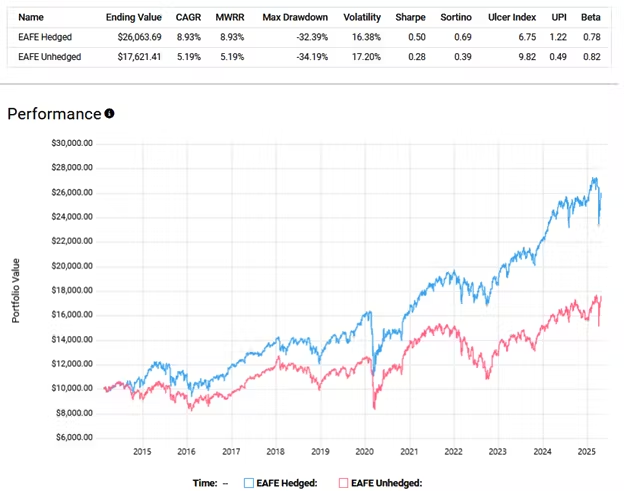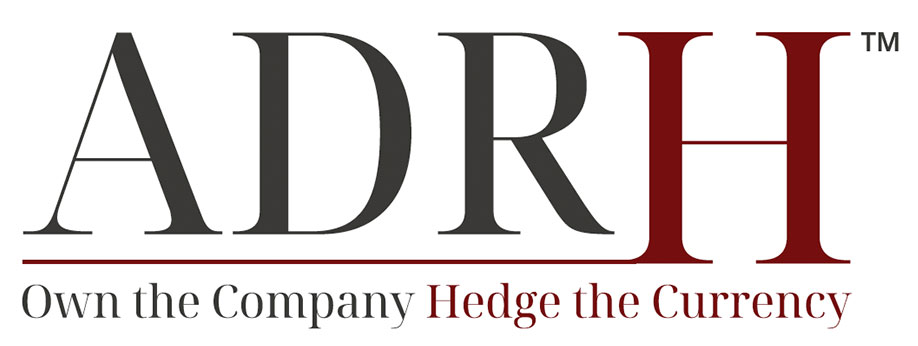By Tony Dong, CETF®, Lead ETF Analyst · ETF Central · May 6, 2025
A built-in currency hedge means these new ADRs may face less headwinds during periods of U.S. dollar strength.
There’s no shortage of ways to diversify internationally these days. Investors can choose from a wide range of ETFs or opt for American Depositary Receipts (ADRs) to gain exposure to foreign companies through U.S.-listed securities.
For example, when you buy shares of Toyota (TM) on the NYSE, you’re purchasing an ADR denominated in U.S. dollars—not the original Japanese stock listed as TYO:7203, which trades in yen.
While ADRs make it easier to access foreign markets, they’ve always come with one major drawback: currency risk. A strong U.S. dollar relative to the local currency can drag down returns, even when the underlying foreign stock performs well in its home market. Historically, this has been a persistent headwind for ADR investors.
But now, a new category called ADRH—short for American Depositary Receipts Hedged—is looking to change that. Launched by Precidian Investments in partnership with Canadian Imperial Bank of Commerce (CIBC), these ADRH listings offer built-in currency hedging. Here’s what you need to know before considering them for your portfolio.
Why Hedge Currency Exposure?
When U.S. investors buy international stocks, whether through traditional ADRs or ETFs, they’re purchasing securities traded in U.S. dollars that wrap underlying equities listed in foreign currencies. The structure gives easy access to global markets, but it also introduces an added layer of risk: currency fluctuations.
Because the underlying stock trades in a foreign currency, but the ETF or ADR is priced in U.S. dollars, any movement in exchange rates can affect performance. If left unhedged, this currency exposure adds an extra source of volatility that has nothing to do with how the company itself performs.
Take a U.S.-listed ETF holding Japanese stocks, for example. All else being equal:
- If the U.S. dollar appreciates against the yen, the value of those Japanese holdings declines in dollar terms. Even if the Japanese stocks rise in yen, U.S. investors may still see muted or even negative returns due to currency drag.
- If the yen appreciates against the dollar, the opposite happens—foreign exchange provides a tailwind. U.S. investors benefit from both stock performance and currency gains.
This dynamic is clearly illustrated by comparing the iShares MSCI EAFE ETF EFA-0.13% with its hedged counterpart, the iShares Currency Hedged MSCI EAFE ETF HEFA-0.69%. From 2014-02-14 to 2025-04-28, HEFA has outperformed significantly, thanks largely to a strong U.S. dollar and a weaker yen. The dollar strength during this period worked against unhedged investors holding foreign equities.

While there’s always debate about the long-term direction of the dollar, it continues to serve as the world’s reserve currency. And despite recent bouts of weakness, dollar dominance is far from over. For U.S. investors looking for cleaner, more stable international equity exposure, hedging currency risk can make a meaningful difference.
ADRs, Hedged: What’s available
Precidian’s partner, CIBC, had great success in Canada by rolling out currency-hedged Canadian Depositary Receipts (CDRs), giving Canadian investors access to major U.S. stocks without exposure to currency swings. Now, they’re bringing that same approach to U.S. investors that come with built-in currency hedging via overnight rolling swaps.
The rationale is simple. When you invest in an international stock, your goal should be to capture the return of the company itself—not introduce uncompensated risks like currency fluctuations. Personally, I’d rather just own the business, not a side bet on a currency pair.
Right now, the current lineup of ADRH listings includes:
- Arm Holdings PLC ARMH – British chip design company behind much of the world’s mobile processor architecture.
- ASML Holding NV ASMH – Dutch semiconductor equipment manufacturer and key supplier to global chipmakers.
- AstraZeneca AZNH – UK-based pharmaceutical company focused on oncology, cardiovascular, and respiratory drugs.
- BP p.l.c. BPH – Multinational oil and gas giant headquartered in the United Kingdom.
- GSK plc GSKH – Global pharmaceutical and consumer healthcare company based in the UK.
- HSBC Holdings HSBH – One of the world’s largest banking and financial services organizations.
- Novo Nordisk A/S NVOH – Danish pharmaceutical company specializing in diabetes and obesity treatments.
- SAP SE SAPH – German software firm known for enterprise resource planning (ERP) systems.
- Shell SHEH – Major integrated energy company based in the Netherlands and UK.
- STMicroelectronics NV STHH – European semiconductor manufacturer serving automotive, industrial, and consumer markets.
- Toyota Motor Corporation TMH – Leading Japanese automaker with a global footprint.
This is just the beginning. Precidian and CIBC plan to expand the lineup with even more ADRH listings in the near future. If you’re interested in what’s coming next, you can view the current offerings and bookmark the official page here.
Please note that this article reflects the author’s personal views and does not represent the opinions of the publication or its affiliates. It is for informational purposes only and does not constitute investment advice. It is essential to seek guidance from a registered financial professional before making any investment decisions.

